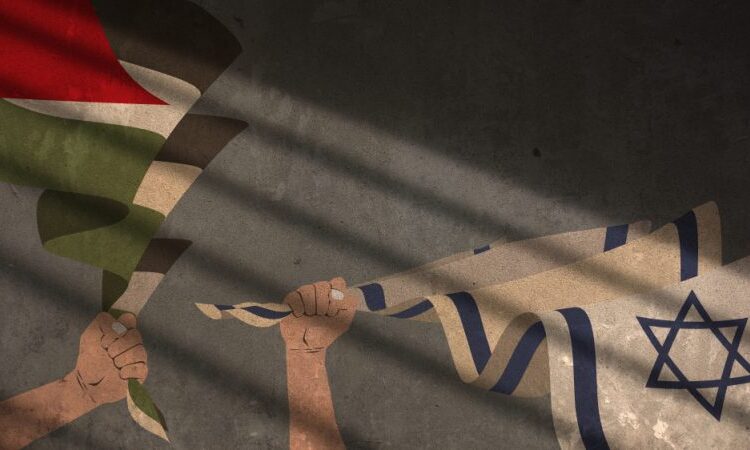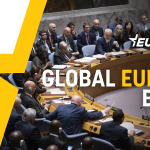
New York – The EU’s plans to help lead a new ‘incentives’-focused Middle East peace initiative, aimed at re-starting talks between Israel and Palestine, Sven Koopmans, the bloc’s special envoy for the Middle East Peace Process, told Euractiv.
Almost 50 foreign ministers from Europe and the Middle East met on the sidelines of the United Nations General Assembly this week to unveil a new initiative, dubbed the ‘Peace Day Effort’, which aims to revive the long-dormant peace process between Israel and Palestine.
“The Israeli-Palestinian conflict is deteriorating dangerously,” the EU’s chief diplomat Josep Borrell said upon the launch of the scheme the EU is co-leading alongside Saudi Arabia, the Arab League, Jordan and Egypt.
“With our initiative, we want to support the path towards a comprehensive peace between Israel and Palestine,” Borrell said.
“What is different in terms of approach from the traditionally US-led efforts, is that it focuses on the end state of peace, not on the substance of a final status settlement,” the EU’s special envoy for the Middle East Peace Process, Sven Koopmans, told Euractiv on the sidelines in New York.
“We do so on the understanding that right now, the Israelis and the Palestinians are not negotiating with each other, and it is unlikely that it will happen anytime soon,” he added.
The initiative seeks to draw up a ‘Peace Supporting Package’ that will maximize peace dividends for Palestinians and Israelis once they reach a peace agreement in the future.
Participants agreed to form three working groups that will be tasked with producing the components of the package on potential post-peace regional, political, and security cooperation mechanisms; a second on economic and environmental cooperation, and a third on human security.
Their work is supposed to start within the next few weeks in Brussels.
Participating countries also agreed to assess the initiative’s progress every three months before presenting the package by September 2024.
“What we start doing with this effort is preparing for the day after,” Koopmans said, adding that the “only one solution is that there will be an Israel and the Palestinian state living side by side”.
“A big part of what happens on that day is not within our control, because of the Israeli-Palestinian peace agreement they need to develop for themselves – we cannot do that for them,” Koopmans said.
“But then there are many other things that are within our control, because on that day – whenever that might be in the future – all these partners – the EU, the Arabs, Americans and the Chinese – all of us, will contribute,” he said.
“For the EU side, we will provide an unprecedented package of political, economic and security support,” he added, which would also include incentives for the Syrian and Lebanese governments to make peace with Israel.
The protracted nature of the conflict and the failure of past peace initiatives have left many observers sceptical about whether or not the new effort will be successful.
Thirty years after being signed in 1993, the Oslo Peace Accords, intended as a temporary measure to build confidence and create space for a permanent peace agreement, have frozen into a system for managing a conflict with no apparent end in sight.
The EU envoy said the new push would be based on offering incentives to the parties, rather than continuing a more punitive approach.
Compared to past efforts, “it is indeed 100% carrots, no sticks,” Koopmans said, adding that this “doesn’t mean that everything in EU policy is just that”.
“We have sticks in some ways for both Israelis and Palestinians. But we have to be realistic – what we want to do is sketch a very positive future to incentivise the parties working towards this goal of peace,” he said.
Asked whether the incentives will be enough to move both sides to make concessions towards a deal, Koopmans said “it is not only about how much money we put on the table”.
“Of course, the incentives are not going to be enough. The fundamental concerns of the parties cannot be exchanged for any potential benefits,” Koopmans said.
“But the incentives may help demonstrate that the world still cares about the conflict and wants to contribute to its solution,” he added.
The wider question would be what type of security contributions could be given to the parties and the region and if the borders are open and the relations between the parties are good – what type of energy infrastructure transportation can be supported.
“Another thing which can be done very concretely: We can imagine on the day of peace, there will be a new vision for the Middle East and maybe even some OSCE-type organisation for the region,” Koopmans said.
“We can actually map that out already, now. We don’t have to wait for the end of the conflict,” he added.
But while peace is unlikely any time soon given the political deadlock between a hardline, anti-two-state solution Israeli government and a weakened Palestinian leadership, some movement seems possible.
Analysts believe a potential Saudi-Israeli normalisation deal could potentially change the setting for the process.
But he refused repeatedly to say what kind of concessions he would offer Palestinians in order to get the deal across the line.
According to United Nations figures some 700,000 Jewish settlers are now established across the West Bank and East Jerusalem, the core of any future Palestinian state, and settlement building is moving ahead rapidly.
“The EU is very clear, as it has been for 40 years: The settlements are illegal and are obstacles to peace,” Koopmans said.
“On the recognition issue, this is up to the individual EU member states, but I cannot see right now that there is going to be a fundamental change there – the last recognition from the EU side was Sweden’s 10 years ago,” he added.
An estimated 3.2 million Palestinians live in the West Bank and 2.2 million in Gaza.
[Edited by Benjamin Fox]







